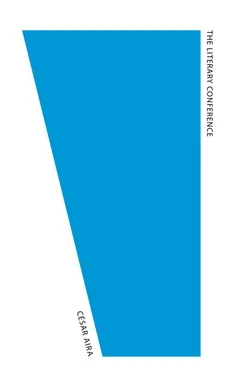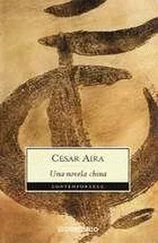“Stupid wasp and the accursed mother who made you!”
“What?” Nelly asked, surprised.
“Don’t pay any attention to me, I understand myself.”
The fact is, I couldn’t blame her. It was all my fault. How could that poor disposable cloned tool know where the man stopped and his clothing began? For her it was all one, it was all “Carlos Fuentes.” After all, it was no different than what happened when the critics and professors who were attending the conference found it difficult to say where the man ended and his books began; for them, too, all of it was “Carlos Fuentes.”
I saw it with the clarity of the noonday sun: the silk cell contained the DNA of the worm that had produced it, and the cloning machine, functioning perfectly, had done nothing more than decode and recode the information, with the results we were now witnessing. The blue monsters were nothing more nor less than silkworm clones, and if they had been magnified to that absurd size it was simply because I had set the cloning machine to run in “genius” mode. Under other circumstances I would have smiled with melancholic irony upon seeing to what awkward and destructive gigantism literary greatness could be reduced when it was passed through the weave and warp of life.
I came to my senses after having lost myself in thoughts that rushed through me like a hiccup, and I felt an urgency to do something, anything, to prevent the imminent catastrophe. Regrettably, I have no talent for improvisation. But this was the time for action, not regrets. I would think of something. And even if I didn’t, everything would turn out well. If I had started it, I could end it. If it had come out of me, it had to return to me. It couldn’t be that I would be responsible for the deaths of several tens of thousands of innocent people and the utter devastation — no stone would remain standing — of this old city. The very possibility of the disaster cast over my being a demonic splendor. In my role as a writer, I am inoffensive. What more could I want than to be diabolical, a destroyer of worlds?! But it is impossible. Well reasoned, however, therein lie the benefits of the changes in level, because then I could, in reality, be a diabolical being, an evil monster: such things are fairly relative, as everyone knows from daily experience.
I grabbed Nelly by the shoulder, and we left the group under the archway. The entire crowd was dispersing, women and men moving suddenly and without any apparent purpose. What could they do? Hide in a cellar? Make final arrangements? In the end, they had to do something.
Nelly was in shock. I brought my face up to hers and spoke to provoke a response from her.
“I’m going to do something. I think I can stop them.” She looked at me incredulously. I repeated, “If anyone can save the city, I can.”
“But, how?” she stammered, looking behind her.
“You’re going to have to help me,” which wasn’t altogether true, among other reasons because I still hadn’t devised a plan. But it worked, her eyes recovered a glimmer of interest. She must have remembered that I was the hero of the Macuto Line and that performing feats of historical proportion was not unknown to me.
We didn’t have to go far. We literally bumped into an empty car that had its motor running and the door open; its owner must have joined the group watching events from the archway.
“Let’s go!” I said. I got in behind the wheel. Nelly sat in the passenger seat. We drove off. It was a taxi, an old Pontiac from the seventies, as long and wide as only cars in Venezuela can be today.
I feared the streets would be blocked, but they weren’t. The paralysis of uncertainty persisted throughout the city. I sped up, and we came to Viaduct Avenue. The only solution I could think of was to find a way through the new-born beasts, reach the cloning machine, and turn it off. In this way at least I could stop their emergence. I didn’t know if putting the machine in reverse would reabsorb the worms, but I could try. In the meantime, I stepped on the gas. We were soon on the viaduct, where we commanded an excellent view of the blue masses slithering down the mountains.
“Where are we going?” Nelly asked. “I don’t think we can escape.”
“That is not my intention, quite the contrary. I’m going to try to get to the place where they are coming from,” at which point I inserted a tiny white lie, because I didn’t want her to guess that I was responsible for the disaster. “What we have to do is close the. . hole they are coming out of, and perhaps make them go back. . underground.”
She believed me. It was absurd, but in a certain way it evoked the spring mechanism of the Macuto Line, over which I had already been triumphant, and this lent it a patina of truth.
I kept climbing, driving faster and faster. The old Pontiac vibrated, its panels rattling. Driving helped me recuperate some of my lost coordination; a sleepless night and the alcohol had left every cell in my body dead tired. I was overwhelmed with exhaustion. But the internal adrenalin bath sustained my movements, and slowly I recovered my faculties.
I turned left onto a small, very steep street, shifted into first gear, and floored the gas until the motor roared. In a final effort the clunker carried us onto the highway that circled the city. I turned right, moving in the same direction as the morning breeze; snakes and rats, escaping in terror from the mountains, were scrambling across the asphalt. We could now see from close up what was happening. The blue of the worms filled the windshield. They were everywhere, nearby and far away, and their forward march was inexorable. The route we were taking would be quite dangerous in a matter of minutes, and if not, would become so later on. We heard a few rocks, luckily quite small, falling on the roof of the car. I began to doubt the feasibility of my plan. Reaching the cloning machine seemed like mission impossible. We would have to abandon the car sooner or later, perhaps quite soon; I hoped to drive at least as far as the intersection with the road that continued along the plateau; but I remembered that I had climbed on foot for an hour or more before setting down the machine. And based on the way events were unfolding, this interval would give the worms plenty of time to turn the city into a tabula rasa. That is, if we managed to avoid them and reach our goal. We passed by one that was slithering down the hill about two hundred yards from the road. Seen from close up, they were overwhelming. Their shape, which from far away had seemed so well defined, so worm-like, here turned into a blue mess, cloudlike. Nelly devoured it all with her eyes, in silence. She turned to look back at the city, as if calculating the time left before the inevitable occurred. At that moment I sensed she was remembering something, and, in fact, she let out a choked exclamation and looked at me.
“César!”
“What?” I said, lifting my foot off the gas pedal.
“I forgot about Amelina!”
This surprise completely confused me. At that moment more than ever before, Amelina felt like a myth, the legend of love. I had already resigned myself to never seeing her again, so her name came to me from a distance that was purely linguistic. But Nelly’s words carried with them an urgency of reality that forced me to adopt a more practical perspective, as if Amelina really did exist. And, undoubtedly, she did. She was somewhere in the city we saw spread out to our right, small and threatened like the model of a city in the hands of an angry child. The image of Florencia, my childhood love, flitted through my mind, the young and enamored Florencia, whom I felt had been reborn in Amelina thirty years later. Like in a trick diorama, what was far away looked close and vice versa. Love’s ghostly stand-ins, which had shaped my life, were spinning around me, forming a tunnel of black light that I was sinking into.
Читать дальше












